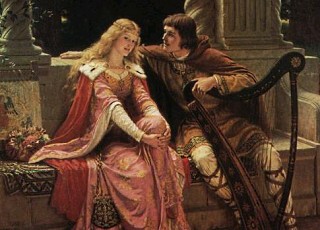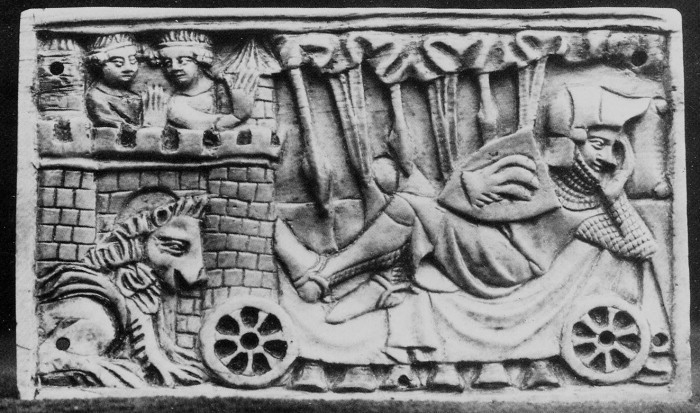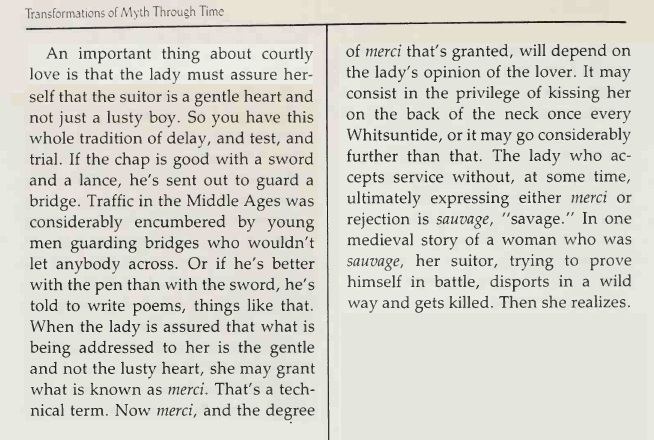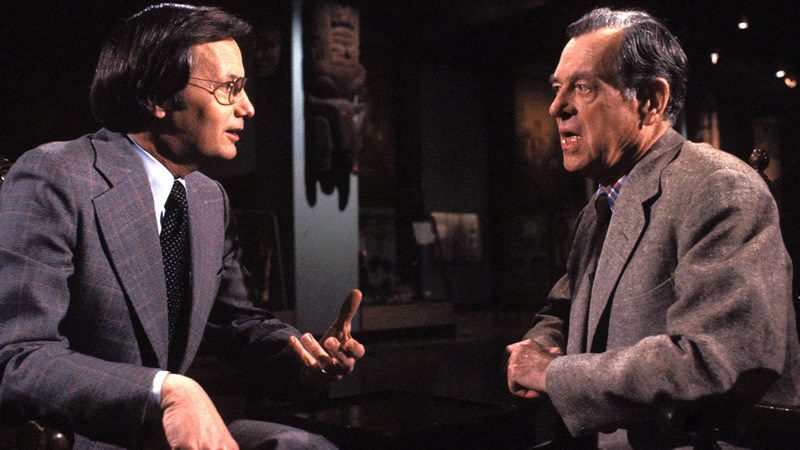Will a man demonstrating romantic chivalry get mercy, or savageness from his Lady Overlord? Joseph Campbell:
Joseph Campbell
The myth of the perilous bed

Joseph Campbell states of courtship in the Middle Ages, “If you wanted to make love to a woman, she’s already got the drop on you. The technical term for a woman’s granting of herself was merci; the woman grants her mercy. Now that might consist in her permission for the man to kiss her on the back of the neck once every Whitsuntide, you know, something like that – or it may be a full giving in love. That would depend upon her estimation of the character of the candidate. The essential idea was to test this man.”1 While there are numerous real examples of tests women asked men to endure, including jousting competitions and other dangerous activities, Campbell provides some fictional examples of tests such as, for instance, ‘the Myth of The Perilous Bed’:
“A number of knights had to experience the perilous bed before getting access to a lady, and it works like this; You come into a room that’s absolutely empty, except in the middle of it is a bed on rollers. You are to come in dressed in your full armour – sword, spear, shield, all that heavy stuff- and get into bed. Well, as the knight approaches the bed, it shears away to one side. So he comes again, and it goes the other way. The knight finally thinks, “I’ve got to jump.” So with his full gear, he jumps into the bed, and as soon as he hits the bed, it starts bucking like a bronco all over the room, banging against the walls and all of that kind of thing, and then it stops. Then he’s told, ‘It’s not finished yet. Keep your armour on and keep your shield over yourself. ” And then arrows and crossbow bolts pummel him- bang, bang, bang, bang. Then a lion appears and attacks the knight, but he cuts off the lion’s feet, and the two of them end up lying there in a pool of blood. Only then do the ladies of the castle come in and see their knight, their saviour, lying there looking dead. One of the ladies takes a bit of ‘fur’ from her garment and puts it in front of his nose and it moves ever so slightly – he’s breathing, he’s alive. So they nurse him back to health.”
Of this myth Campbell states,
“This is the masculine experience of the feminine temperament: that it doesn’t quite make sense, but there it is. That’s the way it’s shifting this time, that’s the way it’s going that time. The trial is to hold on, be patient and don’t try to solve it. Just endure it, and then all the boons of beautiful womanhood will be yours.” [Transformations of Myth Through Time].
This story provides a fascinating insight into the mechanics of gynocentrim. Before the 11th century there was hardly any support in the world for the notion of romantic love; at best it was an underground, unspoken activity disallowed on the world stage where arranged marriages dominated gender interaction completely. When the cult of romantic love appeared, women could for the first time be married and/or choose a male lover with the open encouragement of the society in which they lived. For the first time a woman would force her lover to do worthiness tests – get in a sword fight, a jousting battle, go on a dangerous journey, write some poetry, or procure and provide a precious gift. If he succeeded in her chosen test, he was often rewarded with a small gesture.
The cult of romantic love began in France and rapidly spread to the rest of Europe, and it was a watershed moment for women’s power. Women realised their bargaining power and could now ask for favours, worthiness tests and special treatment in exchange for love. It was here in 11th-12th century Europe that chivalry and gynocentrism were born, and without this event it unlikely that a ‘battle of the sexes’ would have developed, nor would there have been a need for feminists and men’s advocates to address the fluctuating power balance as exists between men and women today.

Sir Lancelot rides the Perilous Bed
[1] Joseph Campbell and Bill Moyers, The Power of Myth
Joseph Campbell on chivalry
An Interview with mythologist Joseph Campbell on the topic of chivalry, with Bill Moyers:
Moyers: So the age of chivalry was growing up as the age of romantic love was reaching out?
Campbell: The Middle Ages was a strange period because it was terribly brutal. There was no central law. Everyone was on his own, and, of course, there were great violations of everything. But within this brutality there was a civilizing force which the women really represented because they were the ones who established the rules for this game.
Moyers: How did it happen that the women had the dominant influence?
Campbell: Because if you want to make love to a woman, she’s already got the drop on you. The technical term for a woman’s granting of herself was merci; the woman grants her merci. Now, that might consist in her permission for the man to kiss her on the back of the neck once every Whitsuntide, you know, something like that – or it may be a full giving in love. That would depend upon her estimation of the character of the candidate… The essential idea was to test this man to make sure that he would suffer things for love, and that this was not just lust.
Moyers: Joseph, that may have emerged in the troubadour period, but it is still alive and well in East Texas.
Campbell: That’s the force of this position. It originated in twelfth century Provence, and you’ve got it now in 20th century Texas.
Moyers: Its been shattered of late, I have to tell you that. I mean, I’m not sure that it’s as much of a test as it used to be.
Campbell: The tests that were given then by women involved, for example, sending a chap out to guard a bridge. The traffic in the Middle Ages was somewhat encumbered by these youths guarding bridges. But also the tests included going into battle. A woman who was too ruthless in asking her lover to risk a real death before she would acquiesce in anything was considered sauvage or “savage”. Also, the woman who gave herself without the testing was “savage”. There was a very nice psychological estimation game going on here. [From – The Power of Myth].
Joseph Campbell on courtly love
Susan Sarandon introduces the following lecture by Joseph Campbell on the topic of chivalry and courtly-love as they took shape in the Middle Ages.
 Susan Sarandon: “We like to think that romantic love is an idea as old as humanity. But it was only in the twelfth century AD that this concept appeared suddenly, not only in Europe, but in Islam and in India and the courts of East Asia. To quote Joe Campbell, for one brief shining moment in every castle in the world from the English Channel to the Persian gulf and the Sea of Japan, the one song was variously ringing the liege-man of love. Chrétien de Troyes was one of the great troubadours of this new song; he was the court poet to Marie de Champagne who ruled as the Queen Regent of France from 1181 to 1187 gathering around her the greatest poets of the age and inspiring a humanistic flowering that would lead in centuries to come to the renaissance.”
Susan Sarandon: “We like to think that romantic love is an idea as old as humanity. But it was only in the twelfth century AD that this concept appeared suddenly, not only in Europe, but in Islam and in India and the courts of East Asia. To quote Joe Campbell, for one brief shining moment in every castle in the world from the English Channel to the Persian gulf and the Sea of Japan, the one song was variously ringing the liege-man of love. Chrétien de Troyes was one of the great troubadours of this new song; he was the court poet to Marie de Champagne who ruled as the Queen Regent of France from 1181 to 1187 gathering around her the greatest poets of the age and inspiring a humanistic flowering that would lead in centuries to come to the renaissance.”
 Joseph Campbell: “Our particular topic today is one that I think can serve to guide us from the general universal themes of myth into the material specifically of the European consciousness which we inherit. The period of the Authurian and Grail romances is dated almost precisely from 1150 to 1250 AD. And in the historical context of this second great phase of occidental culture (the first phase being that of the Greco-Roman periods starting with the Homeric epics) the period of the Authurian romances is the counterpart for the Gothic and modern worlds of the Homeric period for the Greco-Romans. That is to say, it is in that period that the main themes are stated and developed in terms of culture values and the spiritual dimension. The great works appear suddenly and this is the remarkable thing about the dawn of civilizations: within 200 years the whole thing is there and it wasn’t there before.”
Joseph Campbell: “Our particular topic today is one that I think can serve to guide us from the general universal themes of myth into the material specifically of the European consciousness which we inherit. The period of the Authurian and Grail romances is dated almost precisely from 1150 to 1250 AD. And in the historical context of this second great phase of occidental culture (the first phase being that of the Greco-Roman periods starting with the Homeric epics) the period of the Authurian romances is the counterpart for the Gothic and modern worlds of the Homeric period for the Greco-Romans. That is to say, it is in that period that the main themes are stated and developed in terms of culture values and the spiritual dimension. The great works appear suddenly and this is the remarkable thing about the dawn of civilizations: within 200 years the whole thing is there and it wasn’t there before.”

